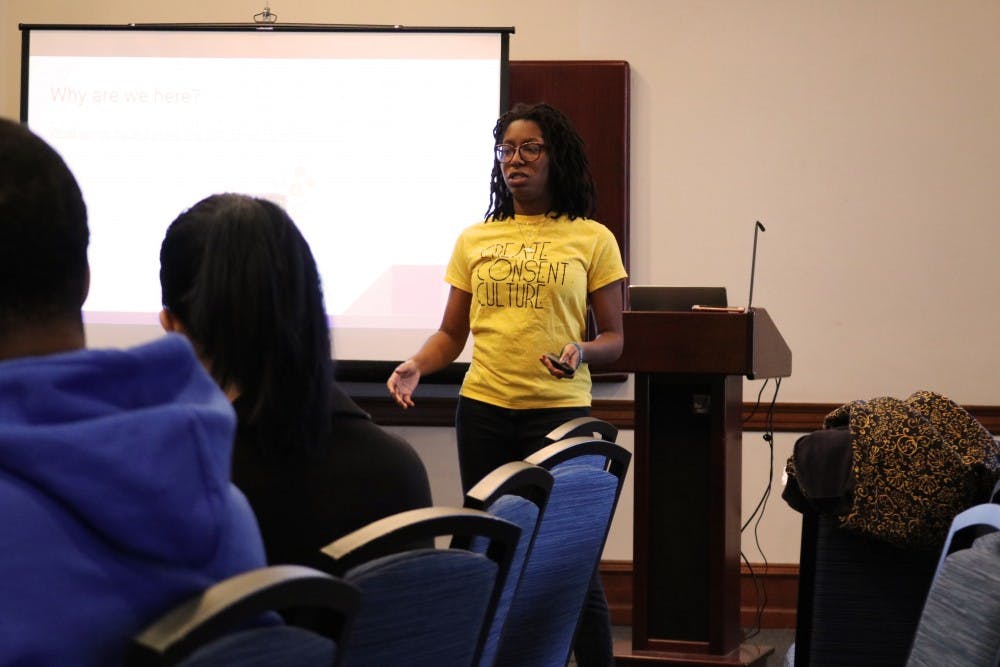
Kenja Farquharson led a discussion titled "Break the Bias. Break the Internet" at the Men and Masculinities Summit.
Credit: Biruk TibebePenn's second annual Men and Masculinities summit gave students a chance to discuss healthy norms surrounding gender and identity on Saturday.
The event, hosted by Penn Violence Prevention, featured a keynote speech followed by panels and small group discussions. Workshop topics included, "Feeling Our Way Through Consent" and "Men, Mental Health and the Media: What lessons have we learned?"
Jeff Perera, who speaks across North America about the difference between healthy and toxic masculinity, gave the keynote lecture on "Building Bridges Between Us." For four years, Perera curated the “What Makes a Man” conference in Toronto, which featured Terry Crews and 2004 College graduate Carlos Andrés Gomez.
In the workshops, students discussed how masculinity affects their daily lives and perceptions. Students shared their perspectives on topics including implicit biases and how gender issues intersect with race and sexuality.
Malik Washington, associate director of PVP, planned the event with the help of a student organizing committee. The summit was held for the first time in 2018.
Washington said the main goal of the summit was to “bring these people in the room hoping that they can have a space to be vulnerable, that they can learn more, and they can ask the questions that maybe they wanted to ask and they can see that there’s a lot of people and examples who care about this and who are moving the conversation forward to a healthier masculinity.”

Malik Washington also participated in the "Break the Bias. Break the Internet" discussion at the Men and Masculinities Summit.
Members of the student organizing committee agreed that the event helped facilitate meaningful conversations surrounding toxic masculinity.
“We frequently talk about issues of gender equity or anti-violence issues, but less frequently through the frame of masculinity,” summit organizer and College senior Luke Clements said. “I think this is the kind of conversation that should be happening everywhere, and why not here?”
Summit organizer and College senior Bella Essex said summit attendees were open and willing to have conversations with and challenge each other.
“The thing I really appreciate about today is the fact that [the summit] gave people language to have those conversations,” Essex added.
Another student organizer, College freshman Wyatt Perez, said “the masculine gender in itself is very performative in certain instances, so creating dialogue and conversation as to what not to do and what’s toxic about that performance is impactful to the kind of interactions you have on campus with other people.”
Washington said he plans for the summit to continue to be held annually. This year's event was co-sponsored by several campus groups, including the Vice Provost for University Life, Penn Wellness, Year of Why, the Interfraternity Council, Tangible Change, the Intercultural Fund, the Ortner Center on Violence and Abuse in Relationships, the Gender, Sexuality, and Women's Studies department.
Jax Lastinger, a first-year master’s student in the Graduate School of Education and a Graduate Associate at Stouffer Hall who uses they/them pronouns, said they brought several undergraduate students to the summit.
“As a [graduate associate], I work a lot with undergrads of various genders and we often see students who have a lot of internalized toxic masculinity,” Lastinger said.
Lastinger added that they came to the summit “to offer students a chance to have those conversations in a more structured setting with people who are experts.”
Correction: A previous version of this article used he/his pronouns for Jax Lastinger, when in fact they use they/them. The DP regrets the error.
The Daily Pennsylvanian is an independent, student-run newspaper. Please consider making a donation to support the coverage that shapes the University. Your generosity ensures a future of strong journalism at Penn.
Donate







